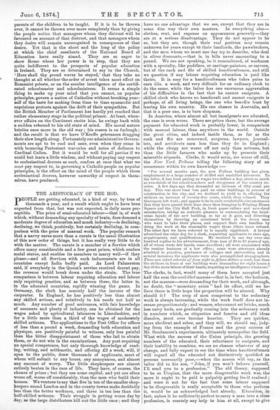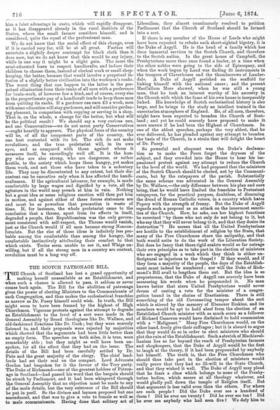THE ARISTOCRACY OF THE HOD.
PEOPLE are getting educated, in a kind of way, by tens of thousands a year, and a result which ought to have been expected from that, but was not expected, is daily more per- ceptible. The price of semi-educated labour—that is, of work which, without demanding any specialty of brain, does demand a moderate degree of education and much industry—is declining, declining, we think, positively, but certainly declining, in com- parison with the price of manual work. The popular •remark that a navvy earns more than a curate is the usual illustration of this new order of things, but it has really very little to do with the matter. The curate is a member of a Service which offers many considerable and a few great prizes, which confers social status, and enables its members to marry well—if they please—and all Services with such inducements are in all countries except India badly paid. As Lord Palmerston said, if everybody in the Queen's service received decent pay, the revenue would break down under the strain. The true comparison is between labour requiring education and labour only requiring practice, and as between these, the latter is, in the educated countries, rapidly winning the game. In Germany, the clerk has scarcely half the income of the carpenter. In England, he has positively less than almost any skilled artisan, and relatively to his needs not half as much. Any number of good scriveners, with fair knowledge of accounts and plenty of industry, can be obtained for the wages asked by agricultural labourers in Lincolnshire, and for a little more than a third of the wages of moderately skilled artisans. The applications to the Post Office for offices of less than a pound a week, demanding both education and physique, are positively painful to witness, only less painful than the bitter disappointment of those who fail to obtain them, or do not win in the examinations. Any post requiring no special competence, but only thorough knowledge of read- ing, writing, and arithmetic, and offering £2 a week, will, if open to the public, draw thousands of applicants, most of whom will submit to any hours, any annoyances, and almost any amount of worry. The little shopkeepers are almost entirely beaten in the race of life. They have, of course, the chance of prizes ; but they use some capital, and yet are often worse off, worse off considerably, than the men who build their houses. We venture to say that five 'in ten of the smaller shop- keepers round London and in the county towns make decidedly less than the better workmen, and three in ten less than the half-skilled artisans. Their struggle is getting worse day by day, as the large distributors kill out the little ones ; and they have no one advantage that we see, except that they are in some dim way their own masters. In everything else— clothes, rent, and expense on appearances generally—they are at a serious disadvantage. They do not appear to be so, but they are, though their real position may remain unknown for years except to their landlords, the pawnbrokers, and the men whom we must one day try to describe, who deal in silver discounts,—that is, in bills never amounting to a pound. We are not speaking, be it remembered, of workmen with a specialty, like puddlers, or carriage-painters, or carvers, but of the rank and file of skilled handicraftsmen, and still we question if any labour requiring education is paid like theirs. It is easy for a handicraftsman who takes pains to earn 35s. a week, and very difficult for an ordinary clerk to do the same, while the latter has one enormous aggravation of his difficulties in the fact that he cannot emigrate. A skilled clerk who knows no handicraft and cannot emigrate is perhaps, of all living beings, the one who benefits least by
leaving his own country. His one chance in Australia, and that is a poor one, is to turn shopman.
In America, where almost all but immigrants are educated, the case is even worse. There are prizes there, but the average payment for educated work is probably lower, in comparison with manual labour, than anywhere in the world. Outside the great cities, and indeed inside them, as far as the rank and file are concerned, surgeons, lawyers, journal- ists, and architects earn less than they do in England ; while the clergy are worse off not only than artisans, but than the little farmers who make up by presents their miserable stipends. Clerks, it would seem, are worse off still, the New York Tribune telling the following story of an occurrence within its own knowledge :- " For several months past, the now Tribune building has given employment to a largo number of skilled and unskilled labourers. To the latter•. it has boon paying as wages two dollars a day, about as much as two-thirds of the school-teachers and clergymen of the country re- ceive. A few days ago they demanded an increase of fifty cents per day. This was more than was paid on other buildings in process of construction in the city, and we declined to yield to it, offering the strikers an increase of twenty-five cents, which they refused. They thereupon left work, and appear to bo in such comfortable circumstances that they have passed their time since then lounging in Printing House Square and the City Hall Park, in fresh paper collars and new-dyed moustaches, taking an aesthetic pleasure in contemplating the hand- some facade of the now building, so far as it goes. and diverting themselves by throwing an occasional brick at the dozen mon who want to take their places, and support their own families by doing the work at the reasonable wages these idlers have refused. The other fact we have referred to is equally significant. A lawyer advertised the other day for a clerk, requesting applicants to state age, acquirements, and qualifications. He received in one day over one hundred replies to his advertisement, from men of 20 to 30 years of ago, all of whom wrote fair hands, some excellent ; all were acquainted with the routine business of a law office ; some were attorneys already admitted to practice, graduates of colleges and universities, and in several instances the applicants were also accomplished stenographers. These men asked salaries of from eight to fifteen dollars a week, less than the strikers in front of our building were demanding for eight hours a day of the mere labour of their hands, requiring no intelligence whatever."
The clerks, in fact, would many of them have accepted just half the sum the unskilled masons—that is, in fact, the hodmen, not the masons—were demanding for their work, and although, no doubt, the " monetary crisis " had its effect, still we be- lieve there is little hope the proportion will be altered. Why should it ? The crop of men competent to the sedentary work is always increasing, while the work itself does not in- crease proportionately; and women, who cannot set bricks, much less carry hods, are gradually coming into the sedentary work in numbers which, as etiquettes and fancies and old ideas dissolve, must ever become heavier. • They are quicker, more obedient and sober, and they will, we should say, judg- ing from the example of France and the great success of Mr. Scudamore's experiments, ultimately monopolise the field. What with the success of the Union principle, the growing numbers of the educated, their reluctance to emigrate, and their inability to combine, we see no chance whatever of any change, and fully expect to see the time when handicraftsmen will regard all the educated not distinctively qualified as persons necessarily poor,—when the mason will say, as the tailor did to his son, " John, if you won't behave yourself, I'll send you to a profession." The old theory, supposed to be so Utopian, that the more disagreeable work was, the more it ought to be paid is palpably getting itself realised ; and were it not for the fact that some labour supposed to be disagreeable is really acceptable to those who perform it, would be an acknowledged fact already. Education, in fact, unless it be sufficiently perfect to carry a man into a close profession, is scarcely any help to him at all, except to give
him a faint advantage in caste, which will rapidly disappear, as it has disappeared already in the rural districts of the States, where the small farmer considers himself, and is considered, quite the equal of the professional man.
We do not know that the social effect of this change, even if it is carried very far, will be at all great. Fustian will entertain a slightly deeper contempt for black cloth than it does now, but we do not know that this would be any injury, while in one way it might be a slight gain. The more the semi-educated learn to respect handicrafts, and induce their children to choose them, instead of clerical work or small shop- keeping, the better, because that would involve a perpetual in- fusion of a slightly better civilisation into the workmen's ranks. The worst thing that can happen to the latter is the per- petual elimination from their ranks of all men with a preference for brain-work, of however low a kind, and of course, every rise in the proportionate pay of a handicraft tends to keep those men from quitting its ranks. If a gardener can earn £3 a week, men with some education will stay gardeners, and will consider garden- ing pleasant, in comparison with copying or serving in a shop. That is, on the whole, a change for the better, but what will be the political result ? We should say a very curious one, and one Conservatives—we do not mean party Conservatives —ought heartily to approve. The physical force of the country will be, of all the component parts of the country, the one best contented with its lot. The rich do not make revolutions, and the true proletariat will, in its own eyes, and as compared with those against whom it measures itself, be exceedingly well off. It is the hun- gry who are also strong, who are dangerous, or rather hostile, to the society which keeps them hungry, yet makes them work, and not those who have taken to a sedentary life. They may be discontented to any extent, but their dis- content can be executive only when it has affected the handi- craftsmen. If the agricultural labourer, for example, is made comfortable by large wages and dignified by a vote, all the agitators in the world may preach at him in vain. Nothing but a great idea or some religious emotion will then put him in motion, and against either of these forces statesmen are and must be so powerless that precaution is waste of time. If, for instance, the whole proletariat came to the conclusion that a throne, apart from its effects in itself, degraded a people, that Republicanism was the only govern- ment consistent with self-respect, the Throne would vanish, just as the Church would if all men became strong Noncon- formists. But the rise of those ideas is infinitely less pro- bable among the comfortable than among the hungry, the comfortable instinctively attributing their comfort to that which exists. Tories seem unable to see it, and Whigs un- willing, but if all the strong men in a country are content, revolution must be a long way off.



































 Previous page
Previous page